- The MS Australia biennial Progress in MS Research Scientific Conference was recently held in Perth.
- Over 250 MS researchers, clinicians, healthcare professionals and people living with MS met to share the latest findings in MS.
- MS Australia expanded the involvement of the MS community in the conference with a community session on the third day.
From 29 November to 1 December, MS researchers, MS nurses, clinicians, allied health professionals and the MS community gathered in Perth to discuss the latest innovations in MS research and strengthen our collaborative network.
The conference is designed to promote the exchange of scientific thought, break down barriers to MS research in Australia, and to provide research updates to the MS community. It fosters collaboration and stimulates innovative research into the causes, prevention, improved treatments and ultimately cures for MS.
With over 60 oral presentations, over 80 poster presentations and 250+ delegates, our ninth Progress in MS Research Conference boasted our largest program ever.
Here are some of the highlights.
Lab to Clinical for Myelin Repair
The conference program commenced with the announcement of PLATYPUS (PLatform Adaptive Trial for remYelination and neuroProtection in mUltiple Sclerosis*), a first-ever adaptive clinical trial for Australians living with MS. PLATYPUS seeks to reverse neurological damage caused by progressive MS, and is funded by MSWA and MS Australia.
Professor Simon Broadley, who is leading PLATYPUS, explained how this trial will test two repurposed drugs (drugs that are already approved in Australia for other indications) alongside each other. By testing drugs with an established safety profile, the pipeline to the clinic is much faster. PLATYPUS is an extension of the OCTOPUS (Optimal Clinical Trials Platform for Multiple Sclerosis) clinical trial which was launched in the UK in April and is expected to commence recruitment in Australia in mid-2024.
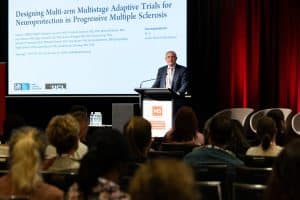
Professor Jeremy Chataway
We were thrilled to welcome Professor Jeremy Chataway from University College London, UK and the leader of OCTOPUS, who gave a
background to adaptive clinical trials. This flexible trial design allows researchers to analyse data throughout the trial and identify much faster which experimental treatments are not working effectively. These trial treatments can be stopped and replaced with new and more promising candidates.
We hope PLATYPUS will bring new therapies to the clinic quickly, giving hope to people living with one of the most debilitating forms of MS and who currently have limited treatment options.
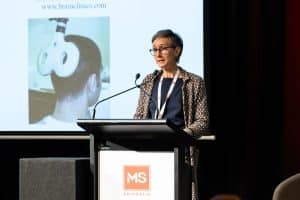
Associate Professor Jennifer Rodger
Associate Professor Jennifer Rodger from the University of Western Australia WA presented her keynote on brain plasticity. This is the ability of the brain to change its activity by reorganising its structure in response to stimuli. Associate Professor Rodger explained how this can be affected by magnetic brain stimulation in MS. Magnetic brain stimulation is approved for the treatment of depression by the Therapeutic Goods Administration (TGA) and provides long-lasting plasticity effects. Working with Professor Kaylene Young from the Menzies Institute for Medical Research TAS, she has shown that magnetic brain stimulation increases the survival of myelin-producing cells in laboratory models. This work has led to the innovative TAURUS clinical trial to determine whether magnetic brain stimulation can promote remyelination in people living with MS.
Health Behaviour and Modifiable Lifestyle Choices in MS
Health behaviour and modifiable lifestyle choices are aspects of life that can influence MS disease progression and disability, such as diet, exercise, gut health, and smoking.
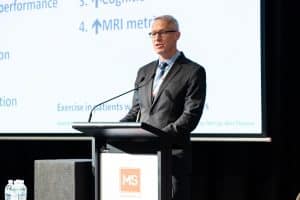
Professor Robert Motl
We know that this is an area of importance to the MS community as it provides a mechanism for people with MS to take control and potentially minimise the impact of MS on their lives. While there is evidence that these factors can affect disease course, this area of research is a complex one with so many variable factors needing to be considered.
Professor Robert Motl from the University of Chicago, Illinois, US, presented overwhelming evidence for the importance of exercise in people living with MS. Studies in this field have revealed that exercise, in addition to improving aerobic capacity and muscle strength, also improves walking performance, quality of life and decreases fatigue and depression. Furthermore, studies have shown that exercise decreases relapse rates and improves cognition and MRI metrics.
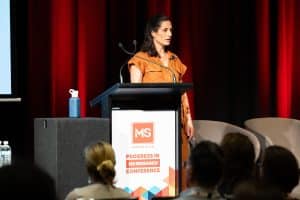
Dr Claudia Marck
Dr Claudia Marck from the University of Melbourne VIC, highlighted how the social determinants of health (non-medical factors that influence health outcomes), can account for 30-55% of health outcomes. Her research focuses on the effects of smoking, including the barriers to quitting and the views of the MS community and clinicians. Her findings emphasise the importance of understanding an individual’s lifestyle and circumstances; a person-centred, integrated approach to health and social services is the best way to enable people to make positive health changes.
Lived Experience & Community Involvement in Research
The contributions of lived experience and community involvement in research serve as guiding beacons, illuminating the path towards more impactful and inclusive outcomes. By actively involving the MS community in research, and fostering a collaborative relationship with the research community, we enrich the research landscape with diverse perspectives and a deeper understanding of the real-world implications. This approach not only empowers those directly affected by MS but also ensures that the research process is more reflective, responsive, and ultimately, transformative.
Debra Langridge from the WA Health Translation Network (WAHTN) gave an overview of where we are and what is next for consumer involvement in research. She is Head of the Consumer and Community Involvement Program, which supports consumers, community members and researchers to work in partnership to inform decisions about health research priorities, policy and practice. She talked us through the importance of involving consumers in research and how it is now an expectation to involve consumers in research. Ultimately, it helps ensure research is relevant to the needs of consumers and the community.
Partnerships between researchers and consumers can change the shape of research. Dr Nicholas Blackburn from the Menzies Institute for Medical Research TAS has developed an ongoing research partnership with Dr Anna Ritchie, a former GP and Deputy Chair of the MS Research Flagship Consumer and Community Reference Committee at the Menzies who lives with MS. Together, they are working to find genetic changes in families consisting of multiple people living with MS. In one family, they identified two genetic changes that may contribute to MS development. They discussed the benefits of their partnership, which Dr Blackburn says helps him reinterpret his research from a consumer perspective and challenges him to think about his work in new ways.
Expert panels also discussed in detail the benefits of consumer involvement in research, resources available to help guide organisations and researchers looking at involving consumers in research, and the National Disability Insurance Scheme (NDIS).
Neuroimmunology
Another important area of focus for this conference was neuroimmunology, the interaction between the immune system and brain and spinal cord.
Keynote speaker Professor Wee Yong from the University of Calgary, Canada, explained smouldering injury in the brain and spinal cord in MS. Smouldering inflammation is a process within MS lesions that are chronically active and grow slowly over many years. It is thought that this is the main driver of disability progression and is independent of MS relapses. Professor Yong talked about his work to understand the driving force behind these chronic active lesions and potential therapies to counteract this.
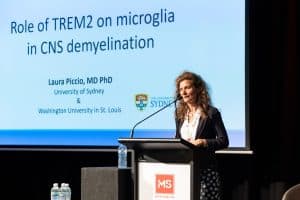
Associate Professor Laura Piccio
Associate Professor Laura Piccio from the University of Sydney presented her work on TREM2, a receptor on immune cells of the brain that is implicated in the survival and growth of these immune cells. Laboratory models of MS that are deficient in TREM2 show a defect in the clearance of myelin debris, and counteracting this resulted in remyelination. TREM2 could potentially be a therapeutic target to enhance remyelination in people living with MS.
Community Session
In previous years, we hosted a Live Update during the Progress in MS Research Conference where the MS community had the opportunity to hear the latest in MS research directly from the experts via live stream. This year, we expanded this by hosting a community session on-site as well as the live stream. It was wonderful to see so many community members attend the conference in person.
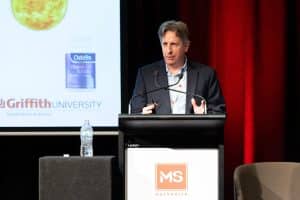
Professor Simon Broadley
Professor Simon Broadley began the community session by explaining our current understanding of the factors involved in MS development and ongoing disease. He explained the mechanisms by which the first drugs to be tested in PLATYPUS might work in MS . Dr Therese Burke AM, a former MS Nurse and former Clinical Platform Coordinator at MS Australia, announced Trial.Smart an educational series for the community exploring different aspects of clinical trials.
Australian researchers discussed how lived experience and community involvement helps research, as well as health behaviour and modifiable lifestyle choices in MS.
Professor Jeannette Lechner-Scott’s overview of the Australian treatment pipeline included the latest results for BTK inhibitors, a new class of drug currently in late-stage clinical trials for MS.
A laboratory model for myelin repair, a clinical trial to reduce falls in people living with MS and a study exploring self-concept (perception that an individual has about themselves) change with MS were also presented.
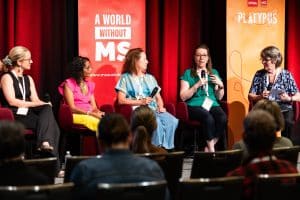
Consumer involvement panel – community session
It was fantastic to see the community engaged in these talks, with many questions asked.
As with the scientific sessions, a panel discussion was held to discuss consumer involvement in research. This time, the focus was on how consumers can get involved in research, the barriers to becoming involved, and how they can learn about and access opportunities to be involved in research. It was great to hear from audience members who have been involved in research and that many have participated in research studies.
A second panel discussion focused on positive change through lived experience, the NDIS review and the campaign that MS Australia created for a better NDIS. MS Australia also showcased its initiatives that have further embedded the lived experience voice, including
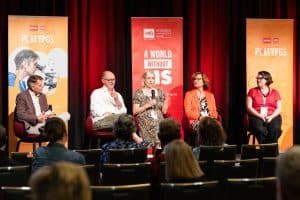
NDIS panel – community session
the Lived Experience Expert Panel and the Consumer Engagement Roadmap.
As the session concluded, MSWA showcased their support services and allied health teams and what a person living with MS has access to at MSWA, from initial consults through to getting set up for services.
Beyond the Conference
It was fantastic to see researchers, clinicians, health professionals and the MS community hearing, presenting, and discussing the latest MS research.
The dedication, commitment, and calibre of the researchers at the conference was truly remarkable. Talented early career researchers showcasing their work served as a clear indicator that MS research in Australia is poised for continuous growth and excellence.
The conference also provided many networking opportunities, including between researchers and the MS community. It connected the dots between leading MS research and community involvement. The dedicated session for the community ensured that individuals affected by MS received timely research updates, as well as information on getting involved in research, the NDIS and MSWA support services.
As the conference concludes, the tangible outcomes include strengthened connections, shared insights, and a mutual commitment to advancing our understanding as we work towards pathways to cures.






